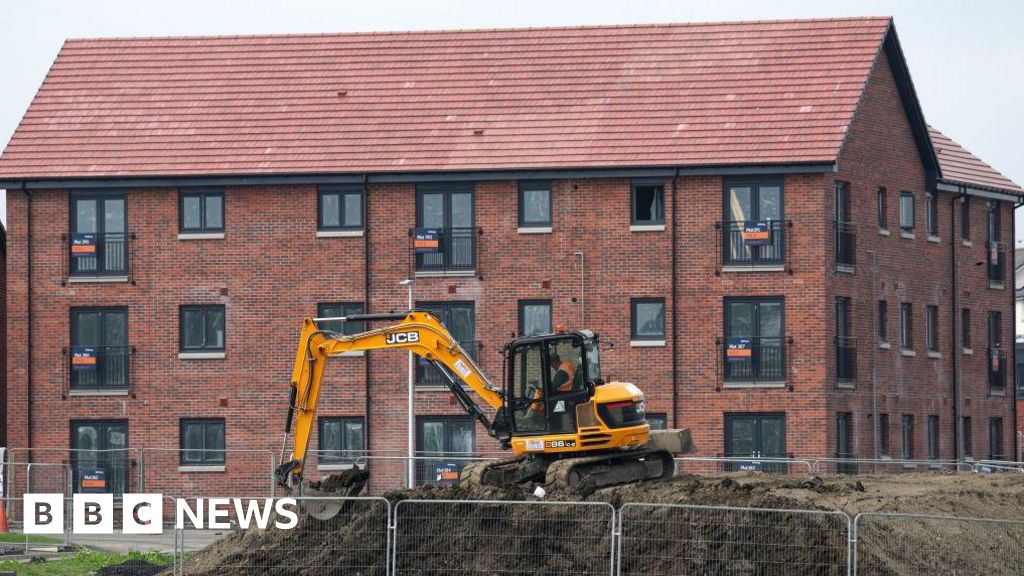Bussiness
How Scotland’s homes keep getting less affordable – BBC News

Image source, Getty Images
- Author, Aimee Stanton
- Role, BBC Scotland News
Property price rises in Scotland are increasingly outstripping people’s ability to pay, BBC analysis shows.
The gap between what people earn and the average cost of a home has grown substantially over the past 20 years.
In 2003/04 the average home cost 3.8 times the typical salary – a gap of £55,000 between income and house price.
But by last year that had increased to 5.2 times the average annual pay – a gap of £150,000.
Housing experts have warned that a significant number of people will never be able to get on the housing ladder, causing long-term impacts.
How much does it cost to buy a property around Scotland?
Data recently published by Registers of Scotland (RoS) shows the median cost of property in Scotland (whole market – all property types) was £185,000 in 2023/24 while a new-build home averaged £300,000.
That means an average property is just over five times the average gross annual salary of £35,518 – and new builds were eight times more than most people’s yearly pay packet.
In comparison to 2003/04, homes were 3.8 times average earnings and new-builds were seven times as much.
East Lothian had the highest property prices last year with the average home costing £283,227, followed by East Renfrewshire at £280,000 and Edinburgh at £270,000.
In relation to new-build homes, East Renfrewshire had the highest average price at £435,000, followed by East Dunbartonshire at £409,125 then Midlothian at £399,995.
‘I viewed 30 properties’
Kieran Davidson told BBC Scotland that buying a one-bedroom flat in East Lothian had felt “out of reach” due to increasingly high prices and competitive nature of the market.
The 34-year-old pet health adviser said: “I knew what I wanted but then what you want and what is a reality is very different.
“After I viewed property four or five, I realised what would be available for my budget. The properties are going for much more than what they are advertised.
“I didn’t want to commit to something I wasn’t happy with and wasn’t going to rush into buying because it’s a big decision.
“You need to be realistic. I got a bit excited by some properties but realised it wasn’t going to happen.”
Describing the experience as “stressful”, Kieran viewed about 30 properties and put in five offers before eventually securing his home.
‘Some will never become homeowners’
Prof Ken Gibb, director and principal investigator of the UK Collaborative Centre for Housing Evidence, said rising property prices were not good in the long term.
“The general picture is that house price to income ratios are widening because of both rising house prices and stagnant or poor performing earnings,” he said.
“When you combine this with tight mortgage regulation and higher interest rates, we see a long-term trend against home ownership, with high deposits and prices continuing to grow when incomes are not.”
RoS data also shows the volume of sales funded by a mortgage made up 64% of the market but this has gradually been dropping since the peak in 2007/08 when they made up 84.5% of sales.
“This is all a reminder that rising, real house prices are not actually good for society in the long term or the economy,” Prof Gibb said.
“What this means is that over time the balance between outright owners and those with a mortgage shifts to the former and in the longer term there will be significant cohorts of people who previously would have become owners who now never will.
“That has benefit implications for retirees (who will still be paying rent), and means they need to build up their pensions more in the light of the fact that they will not have any housing nest egg.”
Affordable home ownership in Scotland
A Scottish government spokesperson said: “We support home ownership and help people on low to moderate incomes from a range of groups through our Open Market Shared Equity scheme to buy a home.
“We have delivered more than 131,000 affordable homes since April 2007.
“This includes affordable homes for social rent, affordable rent, and affordable home ownership.
“We remain focused on delivering 110,000 affordable homes by 2032 and are investing almost £600m in the Affordable Housing Supply Programme in 2024-25.”







